|
2002 Nobel Prize Winners
Former President Jimmy Carter Wins Peace Prize
 Listen to Kathy Lohr's profile of former President Jimmy Carter. Listen to Kathy Lohr's profile of former President Jimmy Carter.
The Awards:
Peace | Literature | Chemistry | Economics |
Physics |
Medicine
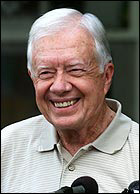
Former President Jimmy Carter is the first American official to win the Nobel peace prize since Henry Kissinger in 1973. Photo: Copyright 2002 Reuters Limited
|
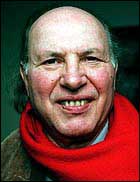
Hungarian novelist and Auschwitz survivor Imre Kertesz smiles after the Nobel Committee awarded him the Nobel Literature Prize in Berlin, Oct. 10, 2002.
Photo: Copyright 2002 Reuters Limited
|

Nobel Announcements
Medicine: Monday, Oct. 7.
Physics: Tuesday, Oct. 8.
Chemistry: Wednesday, Oct. 9.
Economics: Wednesday, Oct. 9.
Literature: Thursday, Oct. 10.
Peace: Friday, Oct. 11.

|
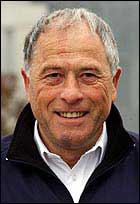
Kurt Wuethrich of Switzerland shares the Nobel in chemistry with John Fenn of the U.S. and Koichi Tanaka of Japan for developing methods of identifying and analyzing "biological macromolecules," including proteins.
Photo: Copyright 2002 Reuters Limited
|
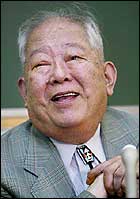
Japan's Masatoshi Koshiba shares the Nobel Prize in physics
for detecting elusive subatomic particles that stream from the Sun by the trillion.
Photo: Copyright 2002 Reuters Limited
|
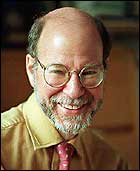
MIT professor Robert Horvitz, above, shares the Nobel Medicine Prize with Sydney
Brenner and John Sulston of Britain for discoveries into how genes affect organs and
the death of cells.
Photo: Copyright 2002 Reuters Limited
|
Oct. 11, 2002 --
Former President Jimmy Carter won the Nobel Peace Prize Friday for his "untiring" quest to find peaceful solutions to conflicts around the world.
The Nobel Committee in Oslo voted unanimously for Carter, citing his mediation between Israel and Egypt that led to the Camp David Accords in 1979. Anwar Sadat and Menachem Begin won the Nobel peace prize that year for signing the agreement.
Carter is the first American official to win the peace prize since Henry Kissinger was a joint winner with North Vietnam's Le Duc Tho in 1973.
The committee also noted Carter's ongoing commitment to human rights and social development. Carter, who heads the the Atlanta-based Carter foundation, has been involved in conflict resolution in Haiti, Cuba, and North Korea. Most recently, the former president expressed opposition to a possible U.S. strike on Iraq without a United Nations mandate. Carter was chosen out of a record 156 nominees.
U.N. Secretary General Kofi Annan won the peace prize last year.
Literature
Hungarian novelist and Auschwitz survivor Imre Kertesz, 72, won the Nobel Literature Prize Thursday for "writing that upholds the fragile experience of the individual against the barbaric arbitrariness of history."
Kertesz, who is Jewish, was sent to the Nazi death camp Auschwitz in German-occupied Poland in 1944, and then to the Buchenwald concentration camp. He was liberated from there in 1945.
The Nobel committee singled out his first novel, Fateless (1975), a story about a young man who survives a concentration camp.
"For him Auschwitz is not an exceptional occurrence," the Swedish Academy said. "It is the ultimate truth about human degradation in modern experience."
 Listen to Rick Karr's report on the literature prize. Listen to Rick Karr's report on the literature prize.
Chemistry
Three chemists have won the Nobel Prize in chemistry for research that has led to a better understanding of the molecules essential for life. Working independently, the three chemists were able to modify existing methods commonly used in chemical analysis so they could be applied to molecules that biologists were interested in. NPR's Joe Palca reports.
Proteins are the molecules that do work inside cells, so its essential that proteins work properly to maintain a healthy life. This year's chemistry Nobel recognizes two separate methods of understanding large molecules like proteins.
American John Fenn, 85, of Virginia Commonwealth University and Koichi Tanaka, 43, of Shimadzu Corp. in Japan, developed ways of adapting a technique called mass spectrometry to the study weight of proteins. Swiss chemist Kurt Wuethrich, 64, of the Swiss Federal Institute of Technology
found a way to apply nuclear magnetic resonance imaging so that it could be used to investigate the shape of proteins.
Their breakthroughs have revolutionized the search for new medicines, the Royal Swedish Academy of Sciences said.
 Listen to Joe Palca's report on the chemistry prize. Listen to Joe Palca's report on the chemistry prize.
Economics
Two Americans win the economics prize for pioneering the use of psychological and
experimental economics in decision-making. The Nobel committee is honoring Daniel Kahneman, 68, of Princeton University primarily for his establishment of theory involving how human decisions can at times vary from or be at odds with established economic theory.
Vernon Smith, 75, of Virginia's George Mason University, was awarded half of the prize for laying the foundation for a field of experimental economics that looks at auction markets, and for his experiments with how deregulated markets might work in the real world.
Both men were cited as innovators by the committee for bringing together the fields of psychological and experimental economics.
 Listen to Vernon Smith talk about the economics prize. Listen to Vernon Smith talk about the economics prize.
Physics
This year's Nobel Prize in physics is awarded to three scientists for their contributions to astrophysics. American Raymond Davis Jr. and Japan's Masatoshi Koshiba will split half the prize; the other half goes to American Riccardo Giacconi. NPR's David Kestenbaum reports.
Davis, 87, of the University of Pennsylvania, and Koshiba, 76, of the University of Tokyo, won for their work with elusive subatomic particles called neutrinos. Trillions pass through Earth each second, undetected and disturbing nothing. Davis stubbornly tried to detect neutrinos coming from the sun by using a giant tank of liquid buried in a mine. He succeeded, and confirmed that fusion powered the sun. Neutrinos are created during that same process.
Masatoshi Koshiba led a more recent neutrino experiment in Japan. It detected neutrinos from even farther away -- a distant star exploding in a supernova.
Riccardo Giacconi, 71, of the Associated Universities in Washington, D.C., won the other half of the Nobel Prize for his work with cosmic X-rays. He built the first X-ray telescope and discovered strange sources of X-rays in the universe. Physicists now think those sources are black holes.
 Listen to David Kestenbaum's report on the physics prize. Listen to David Kestenbaum's report on the physics prize.
Medicine
An American and two British biologists won the Nobel Prize in medicine for their discoveries about how genes control cell development and death. NPR's Richard Harris reports.
American Robert Horvitz and Britons Sydney Brenner and John Sulston will share the $1 million award. They worked independently to piece together one of the central questions of life: how genes control the development and ultimately the death of living cells.
Brenner, founder of the Molecular Sciences Institute in Berkeley, Calif., discovered that the simple structure of a primitive roundworm made it ideal for genetic research. The tiny worm, C. elegans, has only 959 cells in its body.
Sulston, of the Sanger Centre at England's Cambridge University, uncovered how genes control the growth and death of cells in that worm to make its primitive nervous system.
And Horvitz, at the Massachusetts Institute of Technology, discovered two genes that trigger deliberate cell death. Cell death turns out to be critical for healthy life -- old cells must die to make room for vigorous new cells. Organs such as the human brain take shape in part because of genetically programmed cell death.
 Listen to Richard Harris' report on the medicine prize. Listen to Richard Harris' report on the medicine prize.
In Depth
 Browse the NPR archives for coverage of past Nobel Prize winners. Browse the NPR archives for coverage of past Nobel Prize winners.
Resources
• The Nobel e-Museum
|